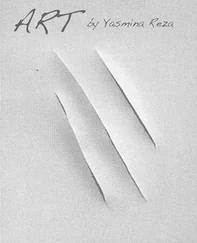* * *
Buzzati saw the immobility of mountains as their prime attribute. “The reason, I believe, is that man seeks a state of absolute tranquility,” he wrote. Etienne Dienesmann hiked with his children on the trails he’d walked in the past with his father. They picnicked at the foot of the same cliffs. They raised their eyes to the same array of peaks. With the father gone, everything was still in place in the limpid chill. Every summer, surrounded by laughter, he felt his own unimportance. Eventually he came to experience it without bitterness.
* * *
Dear Jean-Lino,
Before I ask you to listen to my elucubrations on the fate of objects, you should know that in Sucy-en-Brie at Danielle’s mother’s house (you met Danielle, the documentation manager who’d just come from her stepfather’s burial) Eduardo seems to have become nice. That’s the word that was used. Do animals change their nature? I would sooner attribute it to the helpful adjustment of two creatures in mourning. I know you were worried about him and we’ve kept you informed of his transfer. According to the latest reports, he spends his days on the sill of a groundfloor window, like the old folks in the villages of the South who watch life go by from their doorstep. He oversees the dirt plot where real birds and real mice frolic in full safety for, contrary to the fears of his new owner, he never leaves his post. If not exactly proud of him, at least be easy about him. My mother died last month. In a shoebox in her house I found the nutcracker I made in eighth grade. For one experimental year, girls were given access to the ironand woodworking shops in the boys’ school. None of us chose metalworking, but a few of us plunged into woodworking to avoid sewing class. The teacher was a Chinese man with a wig, a madman. We would finish up fifteen minutes early to leave time for putting the tools back. If the hand plane protruded so much as two millimeters beyond its compartment in the rack, he would scream and slap the kids. Almost the whole year was spent making a nutcracker. The boys built a model with two levels, a kind of press; the girls a mushroom-shaped model. Mine was two colors with a hat that looked like an acorn painted dark brown. When I gave it to my father, I put some walnuts in the package. At first, seeing the object, he exclaimed, “It’s a cock, your thing here!” And then he was impressed when he saw that it worked. My father loved tools and respected the worker. He showed the nutcracker to everyone—that is, to his sister Micheline and friends, to one or two colleagues who came by for a drink at the house from time to time. He wanted to know how I’d made the thread of the screw section, if I’d used a special gouge. He’d say “Pass me Elisabeth’s cock” and do a demonstration with everything that had a shell. He’d say “smooth turn, quiet cracking, impeccable walnut.” It didn’t bother me that he’d say cock, it even made me laugh. That all went on for a while, until everyone forgot about the nutcracker. It must have stayed in the kitchen on a fruit plate and then it disappeared. I never would have thought it went on existing somewhere. I didn’t even remember it. Now it’s lying right in front of me, alongside a newer pepper grinder. It looks astoundingly comfortable. Why do certain objects fall apart and others not? When we emptied my mother’s apartment, if it had been my sister who opened the shoebox she would have tossed it out without a thought along with the other old stuff. Lydie believed in the destiny of things. Would it be so impossible, after all, that the rose quartz in her pendant really had been a gift to her? (I should tell you by the way that I’m not so far myself from asking in restaurants, and also at the butcher’s—where I go less and less—if the chickens were free to fly around, the pigs to wallow, just as I can no longer stand to see an animal on display as an attraction since I started getting the bulletins from her organization.) Jean-Lino, even with the judge’s green light, you and I have only exchanged notes that are short, and from my side hideously stiff, despite my intentions to the contrary. None of my letters, though they’re spurred by an authentic impulse to write, has ever left my house, and none ever really took off. So far it’s been impossible for me to find the right tone. This one too I began by thinking I wouldn’t send either. So I’m speaking to you freely, as we always did, without worrying about the imbalance of condition between us, or about your state of mind. I can just as easily go on about a nutcracker as confess to you for instance that in the early days of my return (my return!) I had to battle a sense of abandonment and the depression that comes when a period of time draws to an end and closes over. No more Manoscrivis above our heads. The Manoscrivis on the fifth floor were the familiar order of things. I know how laughable that can seem compared to the news of the world, but what disappeared with you is an invisible good, the kind we never think about, it’s life we take for granted.
* * *
We went out on the balcony to watch the arrival of the police van and the squad cars.
Truth to tell, half the building was at their windows. I leaned out and looked up. Aparicio was there too. He pulled back instantly, uncomfortable at being seen. The reenactment was scheduled for eleven at night. The nighttime hour was meant to replicate the original conditions. We were also told that we should wear the same clothing we had on at the time of the events. I laid out the undershorts and the Kitty pajamas on the bed, like costumes for a play. A dozen people came into the building, one of them a woman carrying a case and a small folding table. Jean-Lino stepped out of the van between two uniformed cops, his hands cuffed. Seeing him, from up there in the Zara biker jacket and the hat from the racetrack, threw me for a loop. I felt as if there’d been some gigantic mistake. From the standpoint of death and the universe, as I suddenly seemed to see things from my parapet, all this insane activity around an inoffensive man—bound and redisguised as himself—struck my eyes as a grotesque farce.
* * *
The examining magistrate wanted to start with what he termed “the exit from the party.” For that first segment, he thought it unnecessary to dress up as we were three months ago. The stenographer was seated on the landing, at her folding table, before a little portable computer. Photo number one, said the judge: Policewoman playing the role of Madame Gumbiner . A tiny woman with curly hair posed, with her arms glued to her sides, in an oversized basque vest. Jean-Lino, looking just as much a stuffed figure, stood by the elevator in a violet shirt and shorter hair. He was uncuffed. He looked younger, I thought. New variable-lens glasses in metal frames freshened him up. The door to the service stairs stood open. One group of officers was stationed in the stairwell. On the landing I recognized the chief investigator from the Paris criminal police, and one of the cops from the lobby during the arrest. The judge wanted to know in what order people had left our apartment. None of the three of us could recall. After a slight muddle, it was vaguely settled that Lydie was the first to cross the threshold, after the El Ouardis, who were not deemed worth representing. The judge posed the new Manoscrivi couple together with Pierre and me in our doorway for the photo: Madame Gumbiner and Monsieur Manoscrivi leave the Jauze apartment—with Monsieur and Madame El Ouardi who take the elevator . The judge stressed the importance of the narration in talking to me: The photo file will be distributed at the time of the trial, he said, it is an instructional tool for the president of the court. Later, when he orders a photo of Monsieur Jauze returning to his bedroom to go to sleep , he will tell me, “It is important for the jury members to understand that you were left alone.” After this preamble, they all walked up to the next floor. Pierre and I went into our living room. Pierre asked me in a hateful tone if I wanted to watch a little of the news while we waited. I had no desire to see the news. He took his chessboard and sat down to study a problem. He hated it all, and particularly his recruitment into each new episode of the business. When we received the summons for the reenactment, he’d sworn to high heaven that he would not be part of it. Sitting now with nothing to do on the couch next to my husband, I observed the apartment as it had never been in normal times. The cushions equidistant and plumped up, the random mounds of things moved into tidy bookish piles. The gleaming floor, with nothing lying about. My mother would have arranged it all this way. The finger on the trouser seam before the authority of the law. We could hear footsteps and the sound of voices upstairs. I said, “Is he going to strangle the policewoman?”
Читать дальше

![Ясмина Сапфир - Охотница и чудовище [СИ]](/books/35157/yasmina-sapfir-ohotnica-i-chudoviche-si-thumb.webp)
![Ясмина Реза - Бог резни [=Бог войны]](/books/63616/yasmina-reza-bog-rezni-bog-vojny-thumb.webp)
![Ясмина Реза - Бог войны [=Бог резни]](/books/63617/yasmina-reza-bog-vojny-bog-rezni-thumb.webp)








